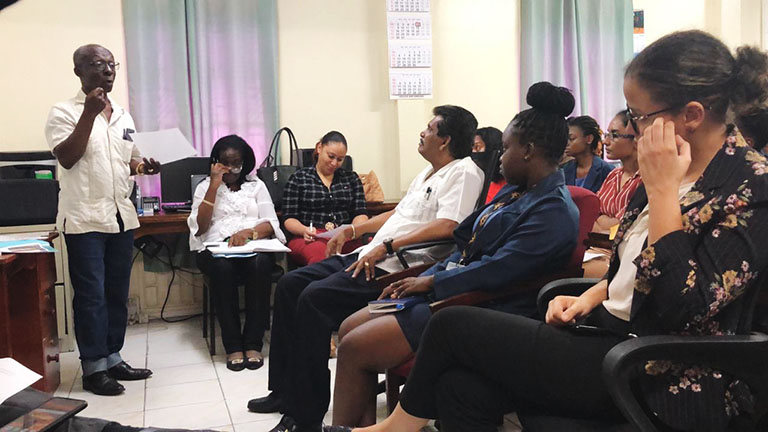PAHO/WHO representative Dr William Adu-Krow is urging that Guyanese begin practicing social distancing immediately in wake of a recent study finding that China could have stopped 95 per cent of its coronavirus infections if social distancing and quarantining had been initiated just three weeks earlier.
Adu-Krow made his position known yesterday when he spoke to the staff of the Ram and McRae accounting firm about the novel coronavirus disease (COVID-19), which was first identified in China at the end of last year.
Up to yesterday, there had been 182,438 cases worldwide and a total of 7,157 deaths. In the Caribbean, cases have been confirmed in Antigua and Barbuda, Guyana, Jamaica, Suriname, Saint Lucia, St. Martin, St. Vincent, and Trinidad.
Dr. Adu-Krow explained that with the spread of the virus globally, preventative measures must be in place, especially in Guyana, where the numbers are still small. He confirmed that only four cases have been identified in Guyana, including one death. But, with the way the disease has spread, he said it is likely that the disease could become out of control in little to no time.
When the disease was first being monitored, a case would be found every two weeks but now, a new case is being identified every three to five days, he pointed out.
Preventive measures which Adu-Krow said people need to start practicing immediately are the washing of hands, sanitising, good hygiene, staying fit, including eating nutritious foods, and practicing social distancing. The doctor suggested that persons take symptoms very seriously and distance themselves from mass gatherings. He noted the study that has shown that if China had started social distancing one week earlier, 66% of the cases could have been avoided; it had started two weeks sooner, 70% to 85% of the cases could have been avoided; and if it had started three weeks earlier, 95% of the cases identified could have been avoided. Therefore, he suggested that persons avoid hugging, hand shaking and the touching of their face, and more specifically their nose, eyes and mouth.
Additionally, he said that contact with any persons who might be ill needs to be avoided and further stated that if persons feel sick, they should stay home. Cold or flu-like symptoms, fever, coughing and problems breathing, he said, are definitely symptoms to take seriously and once noticed the affected person should stay home for 14 days.
Adu-Krow also noted that persons need to beware of false information being shared about the disease. There are no vaccines nor test kits being sold for the disease, he said, and while there has been talk of a vaccine, it would not be available until some months from now. Another rumour about the disease, he said, was that because the country has hot weather, it is not likely that persons will contract it. “Guess what? Now we have four. The virus is competing even with the weather,” he said, before adding that persons need to take necessary precautions. He also informed that until recently persons were advised to continue breastfeeding because there were no cases of it being transmitted through the breast milk but he noted that three days ago a child was born with the coronavirus. He explained that doctors believe the baby contracted it through the placenta, because the mother was tested positive for COVID-19.
Finally, Adu-Krow asked that persons not attach a stigma to the disease because it has similar symptoms to the cold, flu and allergies and not every person sneezing or coughing has the disease, although a shortage of breath would be a definite sign. He also said that persons who suspect they have the disease should feel free to get tested and be quarantined while the symptoms are treated rather than be shamed for it. This would help persons to be less afraid to admit they have contracted the disease, he said. He added that after the symptoms are looked after, persons are advised to continue adopting healthy regimens to avoid possible aftereffects.
Persons who suspect they have contracted the disease based on the symptoms they have should call the Ministry of Health hotline at 227-4986 or 6243067.






